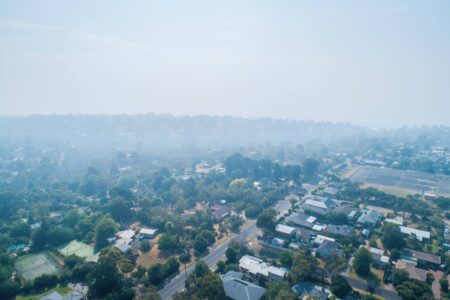=As a California resident, you’re obviously no stranger to our unpredictably dangerous wildfire season. Wildfire smoke and debris can lower your air quality and strain your HVAC, making the unit work harder. Staying proactive and preparing your air system before wildfire season arrives will help you handle these conditions more efficiently.
Here are 10 tips for protecting your HVAC against the smoke and debris discoverable in our wildfire-prone area. These simple suggestions will help ensure a safer, more comfortable indoor atmosphere, even when the air outside is compromised.
1. Inspect and Replace Your Air Filters
As wildfire season approaches, checking your HVAC’s air filters is an easy first step. These filters are the first layer of defense against the invasion of ash and microscopic particles after a wildfire strikes. Replacing clogged filters sustains a cleaner respiratory environment. It also preserves the longevity and performance of your system so you and your family can breathe easier during wildfire season.
Once they amass a specific level of debris, their efficiency drops. This buildup prompts your HVAC system to overcompensate and use more energy than necessary. You should check your filters every 90 days to start and adjust your system up or down, depending on how frequently the filter clogs. During the times that you have smoky air, check more often.
2. Seal Windows and Doors
When wildfires start impacting the area, airtight doors and windows can make a tremendously positive difference in your indoor air quality. Drafty windows and doors let in smoke and fine particles, compromising your breathing health. Sealing these openings around your doors and windows with weather stripping or caulking stops harmful wildfire-related contaminants from entering your living space.
3. Keep the Area Around Your Home Clean
Regularly clearing the area around your home will decrease the amount of wildfire ash and debris that could potentially enter your HVAC system. Remove dried leaves, twigs, and other flammable materials from around your outdoor HVAC unit to prevent any additional risk of fire damage or clogging. A clean perimeter also allows technicians easy access for inspections and maintenance.
4. Utilize Your Smart Thermostat Features
A smart thermostat can be a powerful ally in protecting your HVAC system during wildfire season. You can program these advanced thermostats to minimize the amount of outdoor air brought into your home when air quality is poor. They can also send you reminders to check or replace your air filters, ensuring that your HVAC system isn’t overworking due to clogged filters filled with ash and particulate matter. Smart thermostats offer the convenience and assurance that you are maintaining an energy-efficient and smoke-free home environment.
5. Clean and Maintain Your HVAC Ductwork
The ductwork in your HVAC system is a repository for dust, debris, and ash during wildfire season. Regular ductwork maintenance facilitates a cleaner breathing environment and prevents potential fire-related contaminants from circulating indoors. A proper duct cleaning service touches every area of your HVAC network. Such routine cleanings remove unwanted buildup, ensuring optimal airflow throughout your indoor living environment.
6. Add an Air Purification System
To prevent invasive smoke and fine particulates from wildfires, an air purification system is one of your best allies. When Integrated with your existing HVAC setup, an air purifier can take your indoor air quality to the next level. These solutions filter out an extensive range of pollutants, including those from wildfire smoke, that would typically bypass a standard filter.
7. Verify and Maintain Proper Air Circulation
Optimal indoor air circulation is essential for preserving your home’s air quality, especially during periods of heavy outdoor smoke. A well-maintained air system effectively dilutes indoor pollutants and reduces the concentration of wildfire smoke that can readily seep into your living space and cause problems. After optimizing your air circulation by clearing your ducts and registers, you’ll enjoy healthier breathing as the stale, potentially hazardous air gets filtered outdoors.
8. Protect Your Outdoor HVAC Units
The external components of your HVAC system are more exposed during wildfire season. Reliable protection involves shielding them with specially designed covers when they’re not actively cooling your home.
This protective measure prevents harmful materials that can cause corrosion while decreasing your HVAC’s efficiency. This procedure can be crucial for maintaining its longevity and function in areas like ours that are often heavily impacted by wildfires.
9. Adjust Your HVAC Settings
When wildfire smoke threatens nearby, having a strategic plan for your HVAC settings can make a tremendous difference. Adjusting your thermostat to manage the intake of outdoor air reduces the potential of smoke and hazardous pollutants finding their way into your home.
This proactive approach involves setting your system to “recirculate” mode, limiting the intake of external air. In turn, you’re effectively relying on your home’s air purification capabilities to deliver clean air. An HVAC specialist can help you develop an action plan that addresses the specific needs of your property and is within your HVAC unit’s capabilities. This way, you’ll be poised to maintain optimal indoor air quality during an intense wildfire season.
10. Stay Informed About Local Air Quality Alerts
Education and awareness are vital for protecting your HVAC system and indoor breathing health during wildfire season. Staying posted on the local air quality alerts lets you respond quickly to fast-changing outdoor conditions. Remember to refer to the area’s environmental agencies for updates on air pollutant levels and to inform you of any new safety precautions.
Staying diligent and aware during a wildfire also helps protect your HVAC system. The latest info can tell you how to adjust your thermostat settings or when to replace your air filters as the local impacts of wildfire season intensify.
11. Consider Protective Landscaping
Implementing fire-resistant landscaping can protect your HVAC system from wildfires. Choosing plants that are less flammable, like succulents, and maintaining moisture in your garden creates a natural barrier against encroaching fires. It also means less smoke in your general vicinity. Protective landscaping can also bring aesthetic improvements to your outdoor living space.
12. Schedule Annual Tune-ups
Professional tune-ups are an important aspect of HVAC maintenance. Certified technicians can perform thorough inspections to identify minor issues and keep your system running reliably throughout wildfire season.
Tune-ups also extend the lifespan of your HVAC unit, improve efficiency, and spare you from costly repairs. Routine professional maintenance is a low-cost proactive step in protecting your home’s air quality that pays for itself in the long run.
Assistance Preparing for Wildfire Challenges
At Comfort Bros Heating, Air & Plumbing, we’ve developed our professional HVAC services to ensure your systems are optimally maintained and prepared for peak wildfire season. We also assist El Cajon homeowners with preventative HVAC maintenance plans, plumbing services, and indoor air upgrades like air purification systems.
Contact our heating and cooling team now to learn more about protecting your home’s HVAC system against the hazards of wildfire season!



